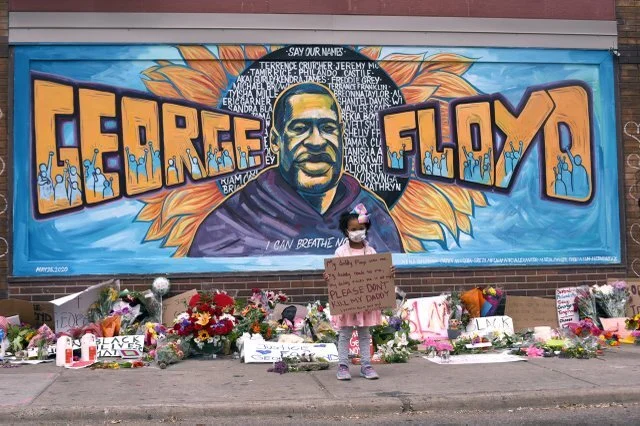Along with the rest of the country, we at CityLights are grieved to see yet another case of an African American man brutalized at the hands of a police officer. These images, along with recent images of Ahmaud Abery and Breonna Taylor, leave our heads spinning and our hearts mourning at another tragic loss of an image-bearing African American life.
As Christians, and as Americans, we must recognize that racism is still a significant problem in the United States. It may not be as blatant as we’ve read in our history books, but it still threatens black lives from sea to shining sea. And while non-African Americans cannot fully fathom what it feels like to be black in America, there are some truths and some principles we can put to practice.
First, we must listen. As Christians, we must listen to the figurative megaphone of the senseless riots and looting in our cities as well as the faint cries from our black neighbors as they grieve yet another senseless killing. As a church, we are currently preaching through Romans and we recently touched on a key verse that has enormous implications in this season: “Weep with those who weep” (Romans 12:15). As the Church, we ought to love our neighbor by following the lesson of the Good Samaritan and pour “oil and wine” on the emotional wounds of our African American brethren rather than pouring salt on open wounds. We must seek to engage our hurt brothers and sisters as opposed to ignoring their pain like the Levite and the priest. This means before we engage with our African American friends and neighbors, whether in person or on social media, we ask ourselves, “Will this give grace to the hearer? Will this be like ‘oil and wine’ or like salt on open wounds?” We must seek to understand the pain, grief, rage, and frustration of the African American community. In addition, we must be quick to listen and slow to speak (James 1:19) especially as it concerns the plight of African Americans in our country overall.
Second, we must learn. For those who are not African-American, we cannot begin to understand the pain of centuries of disenfranchisement and marginalization experienced by the African American community that still has ramifications to this day. While laws may have changed, oftentimes hearts and minds haven’t, which has led to implicit and explicit biases that color the perception of many, including those in power, leading to unfair treatment and practices. As Christians, we know the heart of the problem is the problem of the heart. We recognize that only through the gospel of Jesus Christ can the walls of hostility, both in practice and perception, be removed (Ephesians 2:14-18). As a redeemed people, we know our loyalties lie not in political parties or tribal banners but to our King Jesus, who is redeeming a people for himself from every tribe, nation, people, and language (Revelation 7:9). Yet, we must be learners of our own heart that is still in the process of sanctification, and ask the Spirit to search our hearts for any hidden biases that are clouding our judgement in really learning from others who feel marginalized (Psalm 139:23-24). Research shows that we too have biases that often lead to prejudices that, if left unchecked, keep us from truly loving our fellow image-bearing brothers and sisters of a different race. We must be learners not just of ourselves and discern our own biases but also of others who feel pain and rage at what is happening in our country. Hear their heart. As we listen, we must learn. Loving our neighbors is not only what we DO for them but also what we ARE to them, and in this instance, we must be learners.
Lastly, we must love. However, the love that we show others is rooted in the fact that we have been loved first by a holy God (1 John 4:19). Before Christ, we were the marginalized, the poor, the orphan, the widow and the foreigner. We were marginalized because we had no standing before God and powerless to save ourselves. We were poor because of our moral bankruptcy against a holy God. We were orphans because we had no heavenly Father. We were widows because Jesus was not our bridegroom. We were foreigners because we did not belong to the Kingdom of God. But God extended justice and punished Jesus in our place and now we are rich because we have Jesus’ righteousness. We are sons and daughters of God. Jesus is our bridegroom. We are now part of God’s Kingdom. We have been justified and now have right standing before God.
And as Christ’s love is through action on our behalf, so should our love be rooted in action, and in the face of racism in our country, through acts of justice for all who are marginalized in our society. We need justified Christians doing acts of justice. We fight for the empowerment of the marginalized because we were once marginalized. We give because God gave. We feed because God fed us. We take care of orphans because God adopted us when we were orphans. We protect the widows because Jesus Christ protects his church. We welcome the immigrant because God welcomed us into his home. The prophet Isaiah wrote, “Learn to do good; seek justice, correct oppression; bring justice to the fatherless, plead the widow's cause” (Isaiah 1:17).
It is our hope and prayer that the protests and pain as well as the rage and resistance leads to the Church rising up to address the corrupt hearts of sinful men and women through the only solution, the gospel of our Lord Jesus Christ, and as the redeemed people of God, we seek to continue to listen, learn, and love our African American community.
